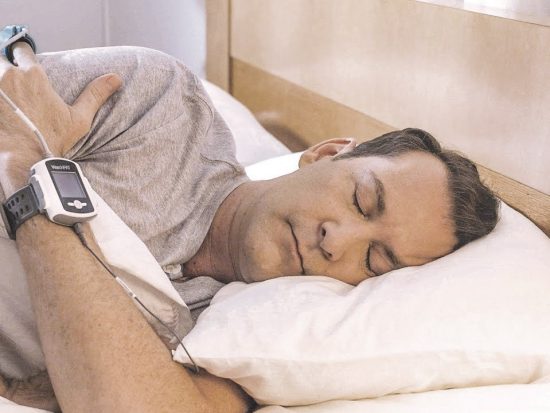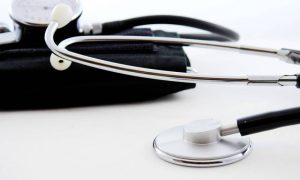Overnight Oximetry, Polysomnography and Home Sleep Tests
Various testing options are used to determine the presence of Obstructive Sleep Apnoea (OSA). OSA is a common sleep disorder in which numerous breathing pauses occur during sleep. The three typical tests are Overnight Oximetry, Polysomnography (PSG) and Private Home Sleep Studies. Each type of sleep study requires a sleep recording to assess certain body functions.
Overnight Oximetry
Overnight oximetry, or nocturnal pulse oximetry, is a medical test to monitor a person’s oxygen saturation (SpO2) during sleep. It involves wearing a small, noninvasive pulse oximeter, typically on a finger or earlobe, while you sleep. The pulse oximeter measures the amount of oxygen in your blood and heart rate fluctuations and records this information throughout the night.
Overnight oximetry is used as a diagnostic tool to confirm the presence of different respiratory conditions such as Obstructive Sleep Apnoea, Chronic Obstructive Pulmonary Disease (COPD), and cardiac disorders that can affect oxygen levels during sleep.
How does Overnight Oximetry work?
Sensor Placement: A healthcare provider will attach the pulse oximeter sensor to your finger or earlobe. The sensor emits a beam of light through your skin to measure the oxygen in your blood.
Data Collection: The pulse oximeter continuously monitors your SpO2 levels and heart rate while you sleep.
Analysis: Once complete, a sleep professional analyses the recorded data to identify any patterns or fluctuations in your oxygen levels during sleep.
Polysomnography (PSG)
Polysomnography testing is conducted in a hospital or specialised sleep clinic; it is the most comprehensive test for diagnosing various sleep disorders. It is beneficial to those with complex sleep issues, such as those with symptoms of Insomnia, Restless Leg Syndrome, Periodic Limb Movement Disorder, OSA and more. Polysomnography provides detailed information about a person’s sleep patterns and helps diagnose sleep-related disorders.
How does Polysomnography work?
If you require a PSG, you will be referred to a sleep clinic, hospital or specialised sleep centre, where at least one overnight stay is required. You will be advised to avoid caffeine or alcohol the evening before taking your test, as these can change your sleeping patterns. Generally, you will be notified to arrive for your overnight stay in the evening.
Multiple Sensor Placement: During a PSG, numerous sensors are attached to your skin with adhesive to monitor various physiological functions. The sensors monitor eye movements, brain activity, muscle activity, heart rate, chest and abdominal movements, airflow, snoring, leg movements and body positions. A small clip is also placed on your finger or ear to monitor your blood oxygen levels. The test is non-invasive and typically painless, although your skin may be sensitive to the adhesive.
Monitoring: These sensors collect data throughout the night, and a sleep specialist will monitor your sleep. The sleep technicians will observe your sleep patterns and make any necessary adjustments to the equipment as required.
Follow-up: Once your PSG is complete, the data is analysed, and a report is created. You will be informed of your results and notified of the next steps; this may involve initialising the recommended treatment method.
Polysomnography is a great way to confirm the presence of many different sleep disorders because of its comprehensive monitoring. Although waiting times for an NHS PSG can be extensive, there are other routes for those showing specific signs of only one disorder.
A home sleep study is a simpler way to confirm Obstructive Sleep Apnoea. Home testing provides accuracy comparable to Polysomnography in a simplified and portable format.

Home Sleep Studies
Many people choose to take a home sleep study over the other testing options as it provides a straightforward alternative.
Testing from home provides convenience, is more cost-effective and is just as accurate.
How does a Home Test work?
Equipment: Once a test is ordered, it will be sent to you in the post. You will find everything you need to take the test included in your sleep test kit. The test includes:
– A set of instructions
– A WatchPAT recording device that goes on your wrist.
– A chest sensor
– A finger sensor
– 2x AAA batteries
– Hypoallergenic adhesive strips
Taking the test: You must turn off any transmitting devices (smartwatches, phones, headphones) before taking your test. You must remove any tight clothing, jewellery, nail varnish or artificial nails, as these can interfere with the test readings and accuracy.
Depending on the type of home test you use, you may or may not need internet access to download the WatchPAT One application.
The WatchPAT sits around your wrist. The finger sensor can be placed on any finger (except the thumb) on your non-dominant hand, and the chest sensor should be applied directly to your skin. You can use the hypoallergenic adhesive strips to secure it onto your chest. The test is comfortable and requires one night of sleep data.
Please note: The instructions and equipment may vary slightly depending on your home sleep test type, but they remain simple.
Results: A sleep specialist will analyse your sleep data and determine whether you have OSA. You will receive a detailed results report explaining the data. Results are with you within two working days after completing the test.
Follow-up: Your results letter will state what you should do next. If you have a positive confirmation of OSA, we will advise you of the best treatment options. We will provide this in your results and guide your treatment process. You can contact us with any questions so we can ensure you get the sleep you need.
The first step to understanding if you are at risk of having Sleep Apnoea, is to complete our FREE online Sleep Apnoea Risk Test. The risk test takes just 20 seconds to complete and assesses your chances of having Sleep Apnoea:
Why choose a home test?
Taking a home test allows you to find out if you have OSA from the comfort of your own home; here are some other reasons why people choose this option:
– Clinically validated against Polysomnography.
– Detects all types of Apnoea occurrences.
– Comprehensive sleep report – AHI, sleep stages, body position statistics, heart rate, respiratory indices and more.
– The PAT signal is supported by the 2017 AASM HSAT Clinical Practice Guidelines for Adults with OSA.
– Easy to use.
– Fast results.
Order a Home Sleep Test
Our home test is the first step towards a restful night’s sleep. If you have any symptoms of Sleep Apnoea, you should take a home test; common symptoms include:
– Nocturia (Frequent toilet visits during the night)
Should you get tested? Please take a look at our Why Get Tested Page here.
If you have any questions regarding our in-home sleep studies, contact us.
All sleep disorder treatments should start with a sleep test. Before you can receive treatment from the NHS or purchase a CPAP machine from us, you must have OSA confirmed.
In-Home Sleep Test
Latest articles
0800 024 8050 (from UK) or +44 800 024 8050 (non-UK) (9am - 5pm UK time, Monday to Friday)
0844 504 9494 (from UK) or +44 844 504 9494 (non-UK))
17 Boundary Business Centre
Boundary Way
Woking
Surrey GU21 5DH United Kingdom




